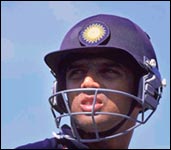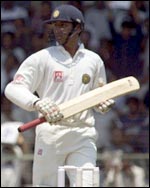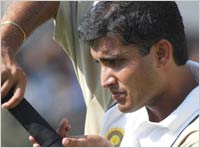 Home > Cricket > Diary archives
Home > Cricket > Diary archivesJanuary 30, 2002
Vis-a-vision
Faisal ShariffOver the last fifteen months, the word 'Vision' seemed to be the mantra of the Indian cricket team. Every time I accosted the players and asked them about what the concept of vision meant to them, they explained how coach John Wright had imbibed in them the meaning of the word when he bundled the probables in Chennai (before the start of the Australian series at home) into a team bus, got them driven to the popular Fishermen's Cove resort, on the Mahabalipuram road; clustered them and asked: "What are the values this team wants to follow?
"Does this team have a vision?
"What does this team want to do?
"Where is this team headed?"
Skipper Sourav Ganguly, his deputy Rahul Dravid, Sachin Tendulkar and Anil Kumble believed that the vision for team would, and should be, to win overseas; and CONSISTENTLY.
 "Our team vision would be to be up there; to compete consistently and successfully, like say Australia and South Africa," said Dravid, when I had asked him about the team's long-term goal.
"Our team vision would be to be up there; to compete consistently and successfully, like say Australia and South Africa," said Dravid, when I had asked him about the team's long-term goal.
"As to why having a vision is important," explained Rahul, "it gives you a goal beyond the immediate game, something to work towards over the long term, something you can identify with. There is no point in going on a journey without a destination in mind. If you are clear about your goal, then you can work towards it -- if you are not, then you tend to get lost."
Kumble believes that it is very important for every team to have a vision, to have an aim. "If you don't have an aim, you don't think; if you don't think, you can't achieve," he says.
Today, fifteen months later, there is a lot of work still to be done; a lot of questions to be answered.
We've won at home, as predicted, but have yet again failed across the shores. Failing to win the series even across the strait in Lanka last August.
The only silver lining were the two overseas Test wins in Zimbabwe and Sri Lanka after almost a decade.
For any international team to be a top unit it needs to have a dependable opening pair, a top class spinner and a genuine fast bowler, not to discount a visionary leader.
Last August, after India lost the Test series in Sri Lanka 2-1, coach John Wright had made special mention of the fact that the only positive of the series was the success of the opening pair of Shiv Sundar Das and Sadagoppan Ramesh.
Ramesh played the last Test in Sri Lanka with an injured back, taped, and popping painkillers like popcorn. The injury eventually forced the Chennai opener out of the South African tour and, with that, shunted all chances of a national call-up even after being declared fit.
Last month, insult accompanied injury when Ramesh, now fighting fit, was dropped from the Tamil Nadu one-day squad without any reason given.
For a man with six ODI fifties, all overseas and against sides like Australia, England, the West Indies and Pakistan, from a mere 24 matches, it defies logic that he fails to fit into the teamís one-day plans for the upcoming World Cup.
So while the experiment of an extended run for Ajit Agarkar and (till the third ODI against England) V V S Laxman continues, Ramesh's ODI and, increasingly, Test career seems to be dwindling.
So how does it feel for a 26-year-old to be discarded despite having the talent and performances to back his case?
"It's a bitter feeling when no one calls you and no one asks for you. You wonder if itís about talent at all after a while," says Ramesh.
"I know that I cannot be picked for the Indian ODI side because my state side refuses to pick me for their domestic games. I am not asking my state to push my cause. But I'm sure I deserve to be in the one-day Tamil Nadu squad."
 Tamil Nadu coach Bharat Kumar refuses to be drawn into any conversation regarding Ramesh's exclusion, though he admits that Ramesh has the game suited for the shorter version of the game.
Tamil Nadu coach Bharat Kumar refuses to be drawn into any conversation regarding Ramesh's exclusion, though he admits that Ramesh has the game suited for the shorter version of the game.
Tamil Nadu skipper Robin Singh empathizes with the thought but refuses to be drawn into taking an anti-establishment stance, still hoping against hope to don the national colours again.
Though Ramesh has been accused of being lazy and complacent by physio Andrew Leipus and some senior players, he has worked hard on his fitness and has lost 3-4 kilos of body weight while preparing for the Ranji matches.
With two major overseas tours this year in the West Indies and England, the opening pair jigsaw is still up in the air. Travelling to these two countries without a third opener is considered to be insanity; not having even two tested openers defies logic.
On the other hand skipper Ganguly subscribes so staunchly to the power of self-denial, that he has refused to believe, or accept, that he has a problem. Ganguly has refuted allegations that he is facing technical problems with short-pitched deliveries. More recently, and still uninclined to admit that he has been failing, the Indian skipper says, "It is just that I don't have a big score. I'm getting the starts, but just not converting them."
Much had been expected in South Africa of the veteran Anil Kumble and upcoming off spinner Harbhajan Singh. By the end of the tour, however, the media in both countries were admitting that Javagal Srinath was the only international class bowler in the Indian team.
Does the team have the vision to spot the next Indian spearhead?
The national selectors and administrators have time and again claimed to have immense talent in the pace department in the country. Zaheer Khan, Ashish Nehra, Tinu Yohannan and the 'will-deliver-soon' Ajit Agarkar, to name a few fast bowlers, are those who could take over from Javagal Srinath after his retirement.
Zaheer and Nehra have been plagued by injuries over the past year and instead of trying to understand the intrinsic reasons for the loss of form and pace by the duo, the selectors have been busy dropping these two.
As one senior player puts it, "The selectors only discuss about dropping players, never about trying to understand why there has been a loss of form. If Zaheer lost pace in a year, maybe, they should have tried to speak with him and figure out a way to preserve him as a future spearhead. Instead, he has been subjected to constant dropping and picking, leaving doubts in his mind. If Allan Donald had been in India he would have retired four years ago."
 A team's vision is the index of its greatness. And it is imminent that the leader envisions the team goals clearly.
A team's vision is the index of its greatness. And it is imminent that the leader envisions the team goals clearly.
Not Sourav, though.
"You canít talk to Sourav about vision. He gets too bored with conversation after a point of time," mentions a player.
Ask coach John Wright about vision and he shoots off: "I don't have a vision; it is not for me, but for the players, to have a vision. That is the most important thing -- it is they who have to decide what they want to do and achieve, and where they want to go. Once they have a vision and spell it out, it is my job to help them achieve it, if I can. We want to become better cricketers, and that means working at our basic skills and disciplines. It means a lot of hard work, really."
Half a world away another overseas tour beckons, another opportunity to realise a goal.
The Rediff Diary -- the complete archives
![]()
![]()
Email : Prem Panicker
©1996 to 2001 rediff.com India Limited. All Rights Reserved.